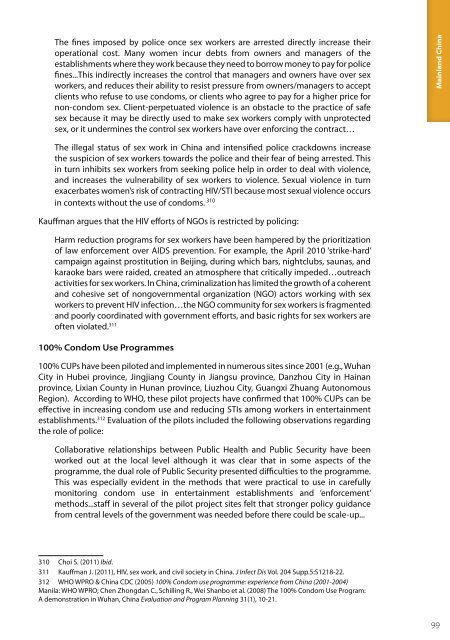SEX WORK AND THE LAW - HIV/AIDS Data Hub
SEX WORK AND THE LAW - HIV/AIDS Data Hub
SEX WORK AND THE LAW - HIV/AIDS Data Hub
You also want an ePaper? Increase the reach of your titles
YUMPU automatically turns print PDFs into web optimized ePapers that Google loves.
The fines imposed by police once sex workers are arrested directly increase their<br />
operational cost. Many women incur debts from owners and managers of the<br />
establishments where they work because they need to borrow money to pay for police<br />
fines...This indirectly increases the control that managers and owners have over sex<br />
workers, and reduces their ability to resist pressure from owners/managers to accept<br />
clients who refuse to use condoms, or clients who agree to pay for a higher price for<br />
non-condom sex. Client-perpetuated violence is an obstacle to the practice of safe<br />
sex because it may be directly used to make sex workers comply with unprotected<br />
sex, or it undermines the control sex workers have over enforcing the contract…<br />
Mainland East Asia China<br />
The illegal status of sex work in China and intensified police crackdowns increase<br />
the suspicion of sex workers towards the police and their fear of being arrested. This<br />
in turn inhibits sex workers from seeking police help in order to deal with violence,<br />
and increases the vulnerability of sex workers to violence. Sexual violence in turn<br />
exacerbates women’s risk of contracting <strong>HIV</strong>/STI because most sexual violence occurs<br />
in contexts without the use of condoms. 310<br />
Kauffman argues that the <strong>HIV</strong> efforts of NGOs is restricted by policing:<br />
Harm reduction programs for sex workers have been hampered by the prioritization<br />
of law enforcement over <strong>AIDS</strong> prevention. For example, the April 2010 ‘strike-hard’<br />
campaign against prostitution in Beijing, during which bars, nightclubs, saunas, and<br />
karaoke bars were raided, created an atmosphere that critically impeded…outreach<br />
activities for sex workers. In China, criminalization has limited the growth of a coherent<br />
and cohesive set of nongovernmental organization (NGO) actors working with sex<br />
workers to prevent <strong>HIV</strong> infection…the NGO community for sex workers is fragmented<br />
and poorly coordinated with government efforts, and basic rights for sex workers are<br />
often violated. 311<br />
100% Condom Use Programmes<br />
100% CUPs have been piloted and implemented in numerous sites since 2001 (e.g., Wuhan<br />
City in <strong>Hub</strong>ei province, Jingjiang County in Jiangsu province, Danzhou City in Hainan<br />
province, Lixian County in Hunan province, Liuzhou City, Guangxi Zhuang Autonomous<br />
Region). According to WHO, these pilot projects have confirmed that 100% CUPs can be<br />
effective in increasing condom use and reducing STIs among workers in entertainment<br />
establishments. 312 Evaluation of the pilots included the following observations regarding<br />
the role of police:<br />
Collaborative relationships between Public Health and Public Security have been<br />
worked out at the local level although it was clear that in some aspects of the<br />
programme, the dual role of Public Security presented difficulties to the programme.<br />
This was especially evident in the methods that were practical to use in carefully<br />
monitoring condom use in entertainment establishments and ‘enforcement’<br />
methods...staff in several of the pilot project sites felt that stronger policy guidance<br />
from central levels of the government was needed before there could be scale-up...<br />
310 Choi S. (2011) Ibid.<br />
311 Kauffman J. (2011), <strong>HIV</strong>, sex work, and civil society in China. J Infect Dis Vol. 204 Supp.5:S1218-22.<br />
312 WHO WPRO & China CDC (2005) 100% Condom use programme: experience from China (2001-2004)<br />
Manila: WHO WPRO; Chen Zhongdan C., Schilling R., Wei Shanbo et al. (2008) The 100% Condom Use Program:<br />
A demonstration in Wuhan, China Evaluation and Program Planning 31(1), 10-21.<br />
99
















